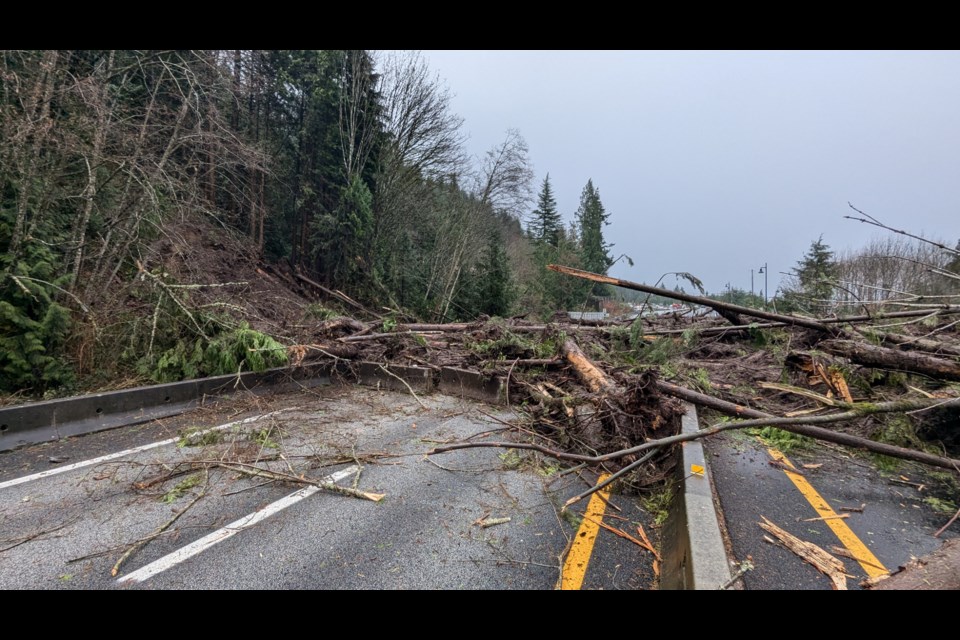It wasn't the weekend anyone expected.
Early Saturday, Dec. 14, a landslide changed the trajectory of the day, and weekend, for thousands of people.
Mud and trees tumbled from Magnesia Creek, affecting Glendale Avenue at the north end of Lions Bay, and spilling debris across Highway 99, near the Brunswick Beach exit, stopping traffic in both directions for almost 24 hours.
Some residents were evacuated, and tragically, one home on Glendale Drive in Lions Bay was displaced by the slide.
One of the residents believed to be in the home was found dead by search crews on Saturday.
As of publication time, a second person was still unaccounted for.
The Village of Lions Bay declared a state of emergency on Sunday night.
In a press release, the municipal government cited the debris flow "that has caused property and structural damage and loss of life."
"We extend our deepest [sympathies] to the family and members of our community. In addition, we would like to thank all first responders and supporting agencies for their dedication and professionalism during this challenging time," reads the release.
The cause of the slide above Magnesia Creek is under investigation.
Ministry of Transport and Canada Task Force 1 geotechnical engineers investigated and determined further slide activity was unlikely.
Working together
With the highway shut, many people were trapped on either side of the slide, unable to get to their destinations.
Thankfully, the cleanup took less than 24 hours.
The highway reopened on Sunday morning, Dec. 15, at about 6:30 a.m.
Agencies whose personnel worked to make sure the road was clear were the Ministry of Transport and Infrastructure (MOTI), RCMP, BC Ambulance Service, Miller Capilano Highway Services, Emergency Management and Climate Readiness, Squamish Nation, the District of Squamish, the Resort Municipality of Whistler, the Squamish-Lillooet Regional District, the Village of Lions Bay, the North Shore Emergency Management, and Health Emergency Management B.C.
While North Vancouver and Whistler municipalities both opened receiving centres for those trapped overnight without a place to stay, the District of Squamish did not.
Asked about this, a spokesperson for the District told The Squamish Chief that events such as the landslide at Lions Bay are a coordinated effort between local and provincial emergency management and response teams through the Sea to Sky Corridor.
"Due to the limited supply of hotel accommodations in Squamish and that many of the individuals impacted were located in Whistler, the District did not open a reception centre in Squamish," the spokesperson said. "The Resort Municipality of Whistler was well equipped to receive travellers and were able to open a reception centre at the Fairmont Chateau. Our focus was to ensure impacted individuals were aware of the available resources in the area and kept up to date on the highway closure."
The municipality considers opening a reception centre when there is a localized event that impacts Squamish directly.
"As reception centres are resource intensive, we work with our neighbouring communities to determine where resources are best used to meet the needs of those impacted."
Historically speaking, the closure was minor compared to past incidents, such as in 1990, when the Loggers Creek landslide closed the highway north of Lions Bay for 12 days.
Be Prepared
The District of Squamish warns residents to be prepared for the unexpected when travelling in B.C., especially during weather events.
"Know the risks and ensure that you are informed about the latest advisories in areas that you may be travelling through."
(Find more information on this provincial site.)
"The District is grateful to all Squamish residents and businesses who supported those impacted by the landslide."
During this difficult time, the Sea to Sky community came together in remarkable ways. Strangers opened their homes to those stranded, offering beds and meals, and even took stranded strangers to a Christmas party with their friends. On the Sea to Sky Road Conditions page on Facebook, messages of gratitude poured in, thanking locals for sharing updates, giving rides, and lending a helping hand.
~With a file from Bhagyashree Chatterjee
**Please note, this story has been corrected to say that the the Loggers Creek landslide was in 1991, not 1990, as was first posted.



